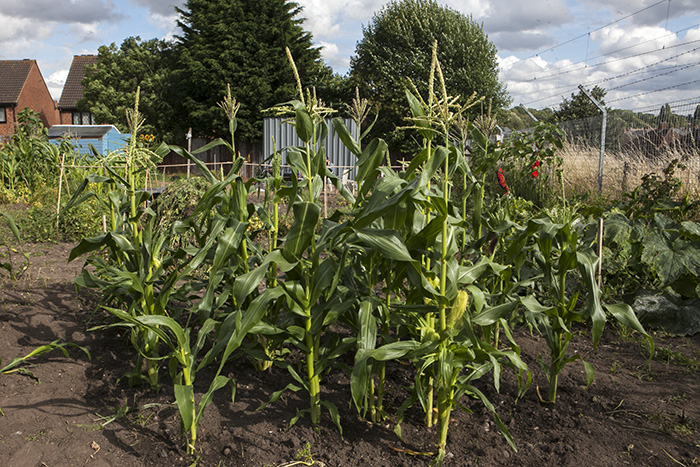Ward End Gardeners Association (WEGA) is about to become a Co-operative!
What does that mean for us?
Since 1951, WEGA has been operating quite comfortably as an ‘unincorporated voluntary organisation’ with a basic constitution. All that time, the Association has managed to carry out its management responsibilities on the five sites we run, liaising with the Allotments Department of the Council which owns the sites. But over the past few years when occupancy levels dropped, It was hard to find the resources to do an effective job, as we’re all volunteers on the WEGA Committee, and the income we’re allowed to keep from the rent money we collect isn’t enough to cover water bills, expenses, repairs etc. This has been especially true recently as more people are signing up but most of them have to face the prospect of clearing rubbish and well-established weeds from long-vacant plots – and we haven’t had the resources to do much about it.

Vacant plot – Lime Tree Road 2020 
Same plot cultivated 2021
This year we were fortunate in being able to attract ‘Flo Pickering Fund’ funds to get some of the drives and fences renewed: this is funding available for sites as a result of allotment land sales. We’ve been applying for some years and were finally successful. The work was done by Haystoun contractors, overseen by the City Architects Department, and it has made a big difference to access and security. But facilities on the sites are still basic and we can still do little to support people new to gardening and allotments.

Fencing – Northleigh Road before work started 
Fencing work in progress
The coming of HS2 and an invitation to apply for a grant made us have a fresh look at how we are operating. HS2 grants and funds run by the Lottery or funding charities are only available to organisations which have ‘good governance’ – in other words, they are run in a democratic, accountable and transparent way, and can demonstrate this through their constitution, policies and procedures. So even if we think we are democratic in the way we operate, we also need to have the right bits of paper AND have effective ways of making decisions that involve our members.
Through our membership of the National Allotment Society, we were able to get the right advice about what to do: their Legal Officer Liz Bunting suggested we register as a co-operative society under the Co-operative and Community Benefit Societies Act 2014, and the NAS could sponsor and support us in setting one up using their recommended model, specially adapted for associations running allotment sites with a membership of plotholders..
So on 11th June, at a Special General Meeting of members, we voted to set up a Co-operative which isan autonomous association of persons united voluntarily to meet their common economic, social and cultural needs and aspirations through a jointly owned and democratically controlled enterprise”. At the meeting, we also adopted the Model Set of Rules for co-operatives approved by the Financial Conduct Authority (FCA) which registers and monitors co-ops. This covers objects (aims and aspirations), membership, shares, voting rights, meetings and management, subscriptions and financial affairs. So it’s a good guide to setting up and running an organisation like ours and a reference if there are problems to sort out. The full set of rules is available on the Members Only section of the website.

Teamwork – Members clearing rubbish on a vacant plot
The process is now in train – our application has gone off, the fee to the FCA paid and we will continue to get further advice from the NAS as we go along.
So what will we gain from doing all of this, rather than spending all our allotment time planting, weeding and watering?
While most of our members CAN spend nearly all their allotment time on their plot, people on the Committee need to give time and energy to things like: access and security on the sites, lettings, making sure plots are looked after, rent payments, repairs and improvements, and so on. All this needs managing as effectively and efficiently as possible, so everyone can feel safe and confident in taking on a plot. Setting up the Co-op should help us do this better.
With the Co-op now set up, we hope to achieve the following:
- Better management of the sites overall
- Best use of the resources we have – money, materials, time of our members
- More involvement from members’ families and friends,
- More involvement and support from the community around the sites
- More access to funds (government, charitable) for improving facilities on sites
Over the next few months, we’ll be inviting plotholders to invest one pound (£1) in a WEGA Co-op share, and also offering family and friends involved in looking after plots the chance of Co-op membership too. Then in November at this year’s Annual General Meeting, there’ll be an opportunity for new members to be voted on to the WEGA Committee and help plan our future development.
In the meantime, the intention is to:
- make major improvements to buildings and other site facilities
- apply for larger grants than we’ve been able to get so far, and
- explore the option of Devolved Management whereby we have more resources to handle the responsibilities we already handle on behalf of the Council which owns the land.
Devolved or ‘Self-management’ is being explored at a city-wide level, as an alternative to the Management Agreement with the Council which is overdue for renewal – but it’s early days yet. So watch this space.

